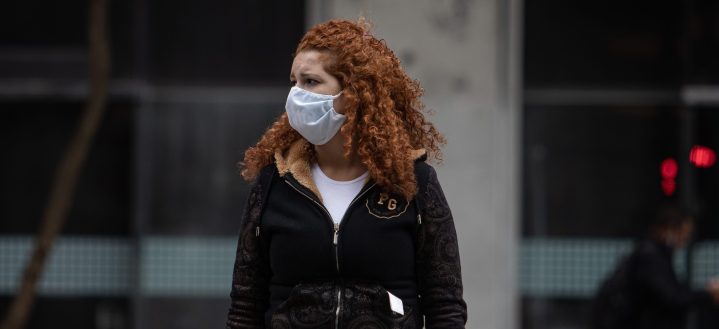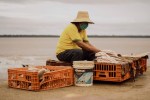This Activist Group Is Feeding Vulnerable Areas in Brazil, a Coronavirus Epicenter in Latin America

A woman wears a face mask on May 7, 2020 in Sao Paulo, Brazil. Photo by Victor Moriyama/Getty Images
Brazil has quickly become a coronavirus epicenter in Latin America. So far, more than 170,582 cases and 11,772 deaths have been confirmed, but the actual numbers could be much higher. It’s hard to know how accurately the situation has been reported to the rest of the world when President Jair Bolsonaro has criticized lockdown measures and insisted that the crisis is a mere “media trick.”
In local communities, people are struggling with the government’s response, which hasn’t properly addressed federal aid for the masses who are out of work. As Brazilians grapple with ways to find food and basic needs, grassroots groups have stepped in to try and fill in the startling gaps Bolsonaro’s administration has left.
As The Conversation reports, one such alliance is the Landless Workers Movement, made up of farms, doctors, schools and restaurant workers. They’ve been around since 1984 and formed to fight against unequal land distribution. As they gained land, they opened institutions, including schools, for agricultural workers. Now, they’ve pivoted their resources to address the pandemic.
Assistant Professor of Education and of Labor and Employment Relations at Pennsylvania State University Rebecca Tarlau, who has researched Brazilian agricultural movement extensively and written a book about the Landless Workers Movement, explains that the group is on the frontlines, bringing food, medicine and more to Brazilians in need.

So far, they’ve donated 500 tons of produce to vulnerable areas and hospitals. They’ve transformed their cafes into soup kitchens, some of their schools have become makeshift hospitals, and they’ve started blood donation campaigns and production lines to supply clinics with alcohol, soap, and facemasks.
One activist Tarlau spoke to said they asked the Landless Workers for donations in northeastern Brazil; within 24 hours, he’d helped collect three tons of produce from Landless farmers.
“We are practicing social distancing but also community solidarity,” the activist told Tarlau.

As Tarlau writes, the movement has continued to mount pressure on the government and urge more action from Bolsonaro. The president, however, shows no signs of compromising: This weekend, he blasted state governors planning to continue precautions as virus numbers surge. He countered their efforts by saying he would add more essential job categories to encourage more people to go back to work.
“Since they don’t want to open, we will,” he said.